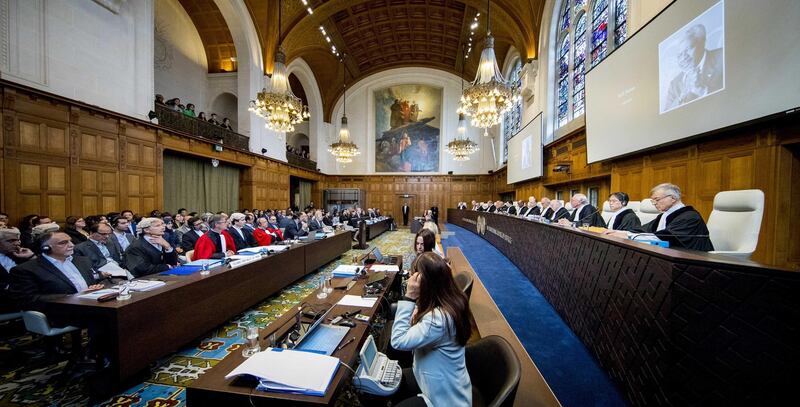Yesterday in a courtroom in The Hague, the country that has relied for years on destabilising the Middle East with proxy wars and the illicit supply of ballistic missiles adopted a veneer of civility.
Lawyers for the Iranian regime demanded that the International Court of Justice suspend US sanctions, which they branded “economic strangulation”. But the lawsuit should be seen for what it is: an attempt to claw back desperately needed sanctions relief after the US tore up the flawed 2015 nuclear deal.
Tehran claims that the sanctions – which will soon hit the vital oil and energy sectors – violate a 1955 US-Iran treaty, which calls for friendly relations and mutual trade. And while there is no reason under international law that the treaty should not apply, decades of acrimony following the Iranian hostage crisis in 1979 have effectively nullified the agreement.
After his determination to throw out the nuclear deal, US President Donald Trump is unlikely to scale back the financial measures when Tehran’s malevolence is still being laid bare. On Sunday, Iranian defence minister Amir Hatami arrived in Damascus to sign a military co-operation deal and stake his claim in rebuilding Syria. But it is Iran that has extended and exacerbated the Syrian war with its funding of proxies and its support for the murderous regime of Bashar Al Assad.
Meanwhile, as The National reported, Tehran has been manipulating social media and creating fake websites to sow discord and misinformation in the US and Europe. Facebook and Twitter are fighting a losing battle to stifle those voices. Perhaps most egregiously, Tehran is forming an alliance with extremism-funding Qatar and has offered support for the 2022 Fifa World Cup, which is already riven by corruption allegations. President Hassan Rouhani called the emir of Qatar to reinforce their bond of co-operation and friendship.
Thus far, Mr Trump’s financial pressure has not forced a shift in Iran’s behaviour. But this case illustrates the extent to which sanctions are being felt in Tehran.
The Iranian economy is in a tailspin. The rial has lost half its value since April while numerous European companies have suspended operations in Iran. Protests against crippling subsidy cuts have swept through more than 80 Iranian cities and towns since December last year, led by those incensed by leaders squandering state funds on regional adventurism. Meanwhile on Sunday, finance minister Masoud Karbasian became the second member of Mr Rouhani’s cabinet to be impeached this month.
But a change in personnel at the ministry will not solve the country’s myriad problems. Years of Iranian policy have led us to this point. The International Court of Justice has a responsibility to hold Tehran to account, while the US is within its right to sanction those who are destabilising the Middle East.





